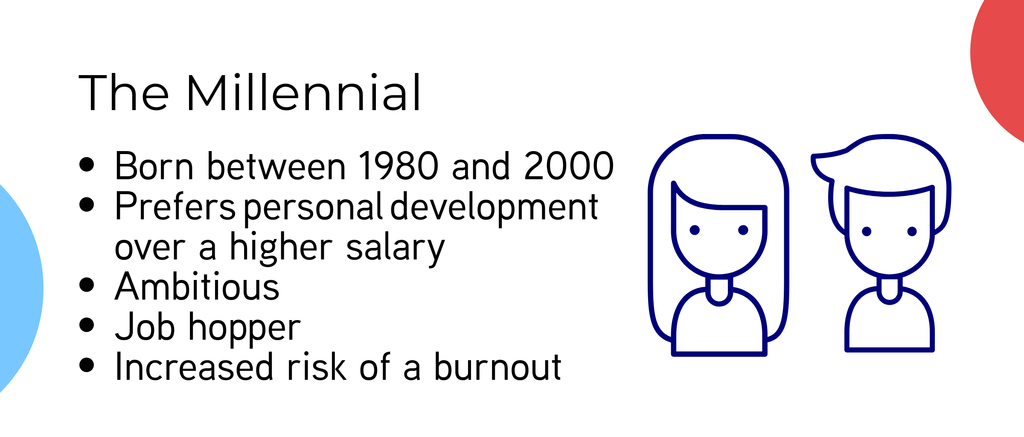
Millenials at work: A Diverse Group with One Common Feature
Geschreven door Henrieke Graven | January 23, 2019Millennials: They're flexible, creative, and idealistic. They believe that personal growth is more important than money. They're job hoppers yet feel deeply involved in their work and often take on more than they can handle. Of course, no two people are the same and you can't pigeonhole the much-discussed millennials. However, this generation that was born between 1980 and 2000 shares these particular characteristics. But what does this translate into at the office? And how can you be a good employer for the millennial?
Personal growth is more important than money
Millennials are often called idealistic. Yet, this doesn't mean that they'll work for peanuts. But this generation genuinely has a different approach to life and thinks differently about money. Having a big lump of money in their savings account is not their ultimate goal and might not even be necessary for a generation standing at the center of the shared economy. The many temporary and flexible contracts that define the times are also forcing millennials to handle money differently and to think about the future in an entirely new way. Millennials are not desperately hoping to get offered that permanent contract and will choose personal growth over money. They understand the importance of professional growth and self-development for flexible employment and to keep their options open. It's up to the employer to facilitate this growth by engaging with millennials and clearly outlining their opportunities and identifying their dreams. The 5D cycle developed by Appreciative Inquiry can function as an important tool in this. It consists of five steps – Define, Discover, Dream, Design, Deliver/Destiny – that can serve as an inspiration for developing a new vision for the future. This form of communication between the employer and employee creates the energy needed to make this vision a reality. And most of all, it enhances the employee's sense of involvement.
Equality is everything
The way in which you communicate with millennial employees during a development talk is also important. Millennials have an inherent sense of equality and believes that their opinion is just as valid despite their youth and inexperience. This belief demands a new method of working together and a new approach to management. Sincerity is a vital aspect of this. Ensure that you include your employees, that everyone is heard, and that you trust in them – even in difficult situations. Listen to everyone and show your appreciation for staff members' contributions. An informal approach to leadership and a casual style of communication suits this method well, but be sure to keep the conversation meaningful. As a manager, it's your job to master the right vocabulary to engage in an open conversation and to dare to show your more vulnerable side.
Help to set boundaries
Despite their positive aspects, the flexibility, ambition, and great sense of responsibility carried by the millennial also have a negative side. The combination of freedom and the high demands that are set by others and that millennials set for themselves can lead to a burnout. Although they require freedom, they also need to know what exactly is expected of them. So, be clear in expressing your expectations and start the dialogue with your employee with a new perspective. Set goals together and offer guidance to help your employee to achieve them. In this situation, the traditional yearly performance review is not enough. Instead, you have to constantly engage with your employee to explore opportunities for growth and identify possible problem areas in time.
These skills that the modern manager needs can be learned. All it takes is plenty of practice, application, receiving feedback, and trying over and over again. We're here to help your organization take the first step in the right direction, for example with our interview training courses for leadership.




